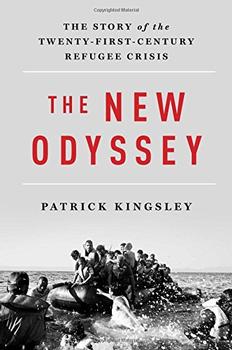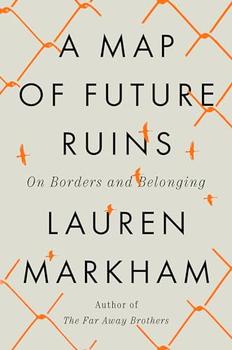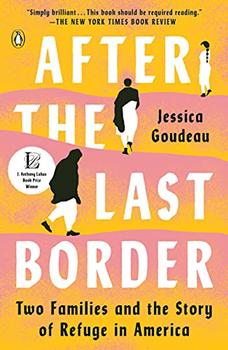Summary | Excerpt | Reviews | Beyond the book | Read-Alikes | Genres & Themes | Author Bio

The Story of the Twenty-First Century Refugee Crisis
by Patrick KingsleyOne of the foundational works of the Western imagination, The Odyssey, by the Greek poet Homer (see 'Beyond the Book'), tells the story of one man's epic struggle in the wake of devastating warfare as he embarks on a years-long journey that requires him to battle sorcerers, monsters, even the dead. It's a defining text in the shaping of our understanding of the ancient world, its mythic contours and its primal impulses. So if you are going to call your book The New Odyssey, you'd better have a hell of a story to tell.
Patrick Kingsley, author of The New Odyssey, tells a hell of a story.
And in some ways, it's become the story of our times. There's no way Kingsley could have foreseen the election of Donald Trump as U.S. president when he began to report first-hand the plight of refugees from Syria, Egypt, and sub-Saharan Africa throughout Europe, several years ago. But Trump's headline-making "Executive Order" restricting access to the United States for refugees from certain designated countries has given added prominence to a humanitarian crisis that is engendering wildly different responses from citizens and political leaders around the globe.
Kingsley, the Guardian's first ever "migration correspondent," has fashioned a book that is part policy analysis, part history lesson, and part page-turning thriller. Let's add "public service" to that list of nouns; for those to whom the "refugee crisis" is some abstract, geo-political conflict that seems like it doesn't concern them, Kingsley has something to say to you: these are your fellow human beings. And they are suffering and dying in alarming numbers, forced to make the grim calculation between staying in places like Damascus, Kabul, and countries like Somalia, which are being destroyed by shell fire and terrorized by warlords and religious extremists or risking their lives with smugglers who cram them in the trunks of jeeps traversing hundreds of miles of burning desert and rickety, dangerously overcrowded fishing boats at the mercy of the Mediterranean sea for days or weeks.
Once a migrant makes the decision to leave, there are a hundred ways his or her journey might be upended, from being stuck in a sort of prison camp run by the smugglers (who ransom their captives to extract even more money from their families), to arrest by law enforcement officers of varying degrees of legitimacy, to starvation and death by disease or exposure.
Not all refugees face such dire circumstances, of course, but even those who somehow avoid the more horrific aspects of migrant resettlement still face months or even years in refugee camps (often with small children and elderly family members in tow), and an arduous journey across continents with no promise of acceptance—or even survival. In the last two years, more than a million migrants crossed the Mediterranean by boat, many thousands drowning before reaching shore. As their numbers have swelled, so too has the determination of many European nations—and most recently the United States—to not become a haven for these refugees. Kingsley, however, reveals how laughably inept most of the high-profile border security measures are in these countries, which "hope to contain the problem with short term-solutions such as fences and naval patrols. But these tactics merely shift the migration flow to more porous borders."
Kingsley argues that the impulse to try to prevent these refugees from re-settlement is wrong-headed and that contrary to their portrayal as drains on the welfare system of wherever they land, "people who travel for so many miles through such horrific conditions in order to find work cannot accurately be portrayed as lazy benefit-scroungers." His thoroughly informed reporting gives him the street cred to step out of his objective reporter's role once in a while to weigh in on who he sees as bearing responsibility for the situation—namely the European powers for their bumbling response to the crisis:
After a series of bad-tempered meetings, the countries of the EU finally agree to share 120,000 of the refugees who'll land in Greece over the next two years, and to resettle 40,000 of those still languishing in Lebanon, Jordan and Turkey. Britain opts out of the agreement, but promises to admit 4,000 every year for the next five years. Wonks in Brussels hail all this as a huge step forward…in reality, it's a pathetic failure. More people are now landing in a single day on the island of Lesvos [than Britain] will welcome in the next twelve months."
The New Odyssey tells the story of the current crisis in chapters that alternate between a "big picture" overview and a riveting focus on the struggle of one lone immigrant, a Syrian refugee named Hashem al-Souki, who fled his native Damascus in search of a permanent place to resettle with his family. No less heroic in his years-long struggle to find a safe haven than his Homeric doppelganger, Hashem finds himself thrown into dank holding cells, crammed into refugee detention centers in Libya for months, threatened with violence, arrest, robbery, and psychologically manipulated by his "smugglers" with several "false starts"—trips to the sea for disembarking to Italy or Greece, only to be denied a place on one of the already-overcrowded boats, then sent back to the camps to endure weeks or months of more waiting and uncertainty, cut off from his family, his funds, and his future.
It's maddening to read about his Kafkaesque travails, and almost impossible to imagine actually living through such an experience. The author makes a strong case that the Syrian refugee crisis is a tragedy that could have likely been avoided with concerted, coordinated intervention among Western nations: "The hand wringing of the international community led to the arrival of Isis. The failure to support the secular-leaning rebels such as the Free Syrian Army, the group that Hashem has the most sympathy for, had created a vacuum in which psychopaths like Isis could prosper."
Kingsley's moving yet sober account does not provide much reason for genuine optimism. International rescue efforts at sea are being defunded by the United Nations, the Italian Coast Guard has drastically reduced its intervention and rescue efforts, European borders are tightening, and anti-immigrant sentiment in the West is being inflamed by right-wing politicians. Kingsley darkly notes that "European politicians believed that the continuation of a rescue mission would only makes things worse encouraging more migrants to make the journey"—a journey the author claims cannot be stanched, no matter how much invective against immigrants is unleashed. As one Syrian refugee quoted in the book puts it, "Even if there was a European decision to drown the migrant boats, there will still be people going by boat because the individual considers himself dead already. Right now, Syrians consider themselves dead."
And no signing ceremony in the White House Rose Garden is likely to change that.
![]() This review
first ran in the March 8, 2017
issue of BookBrowse Recommends.
This review
first ran in the March 8, 2017
issue of BookBrowse Recommends.

If you liked The New Odyssey, try these:

by Lauren Markham
Published 2024
A mesmerizing, trailblazing synthesis of reporting, history, memoir, and essay.

by Jessica Goudeau
Published 2021
The story of two refugee families and their hope and resilience as they fight to survive and belong in America.
The less we know, the longer our explanations.
Click Here to find out who said this, as well as discovering other famous literary quotes!
Your guide toexceptional books
BookBrowse seeks out and recommends the best in contemporary fiction and nonfiction—books that not only engage and entertain but also deepen our understanding of ourselves and the world around us.